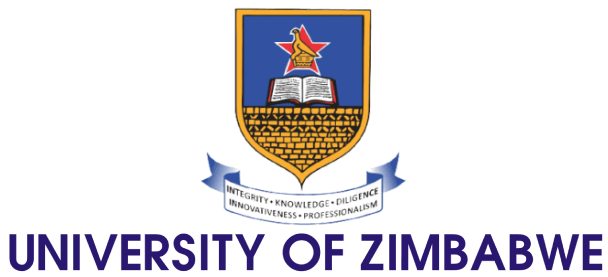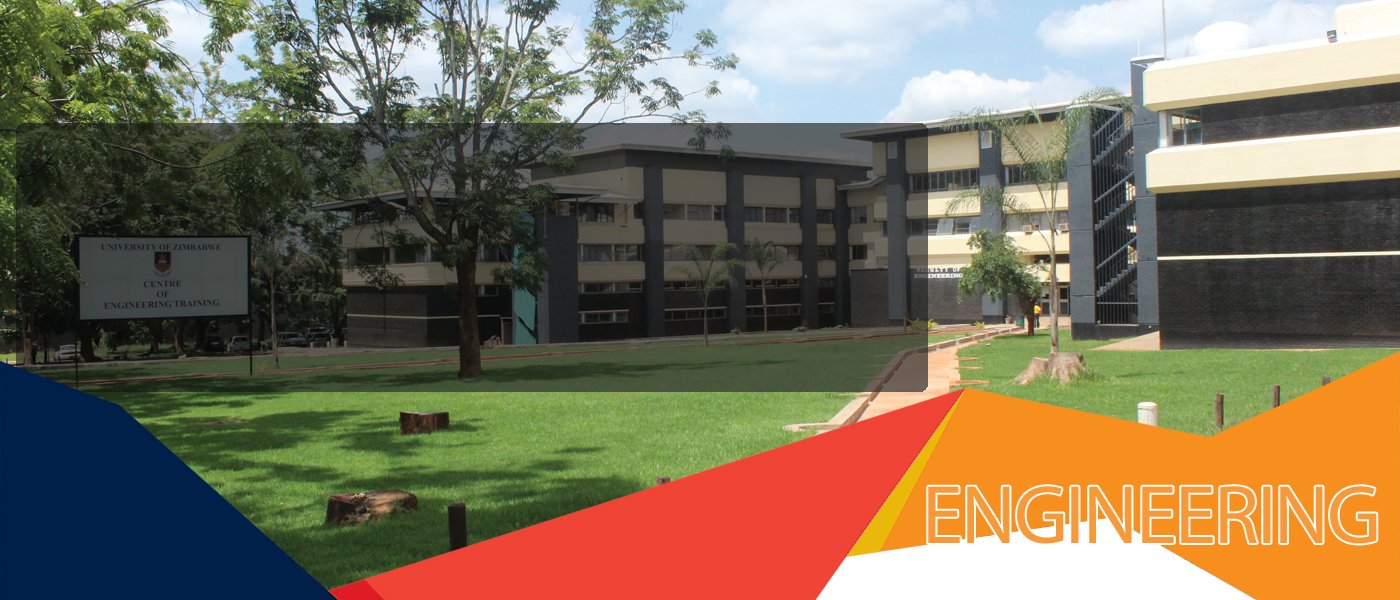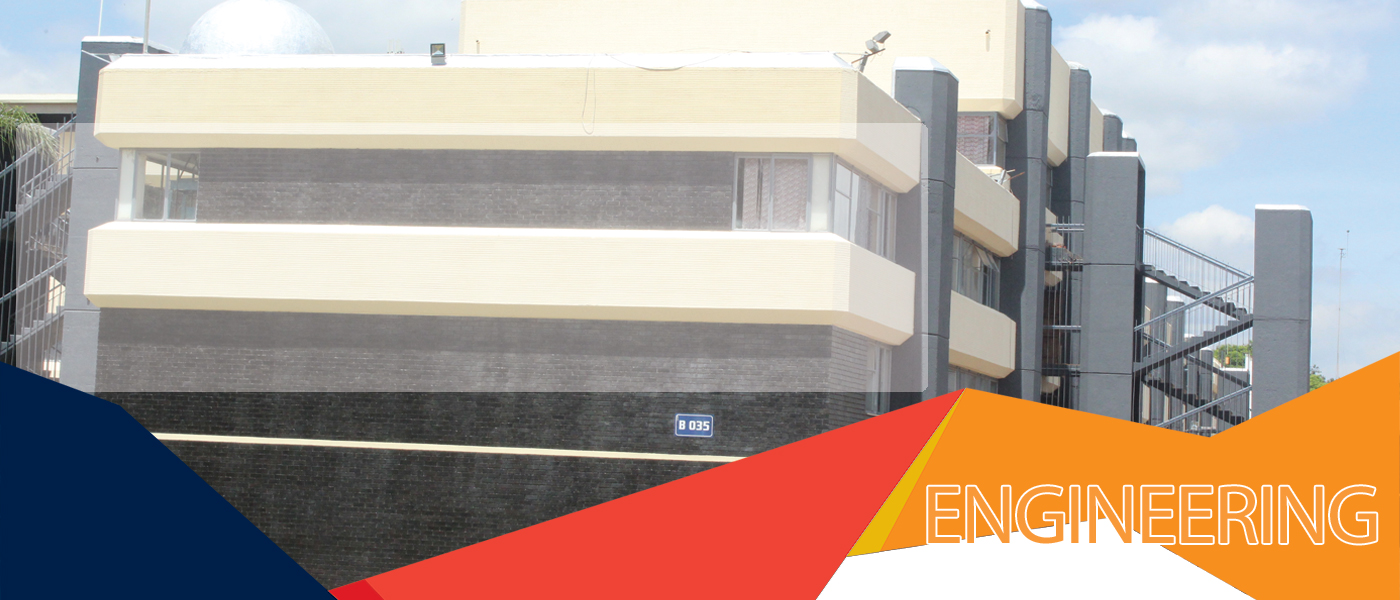Undergraduate
-
BSc (Honours) in Construction Engineering and Quantity Surveying
-
BSc (Honours) in Civil Engineering
Postgraduate
The Department of Construction and Civil Engineering runs 7 MSc Programmes that have been launched under the University of Zimbabwe's reprogramming exercise:
- MSc in Integrated Water Resources Management
- MSc in Water Resources Engineering and Management
- MSc in Sanitation and Wastewater Management
- MSc in Geotechnical Engineering
- MSc in Structural Engineering
- MSc in Highway and Transportation Engineering
- MSc in Quantity Surveying
The MSc Intergrated Water Resources Management (IWRM) programme has been largely funded by WaterNet, a regional network for capacity building in water resources management in Southern and East Africa. WaterNet is a regional network of university departments and research and training institutes specialising in water. The network aims to build regional institutional and human capacity in Integrated Water Resources Management (IWRM) through training, education, research and outreach by harnessing the complementary strengths of member institutions in the region and elsewhere. WaterNet member institutions have expertise in various aspects of water resources management and are based in Southern and East Africa. For more see https://www.waternetonline.org/
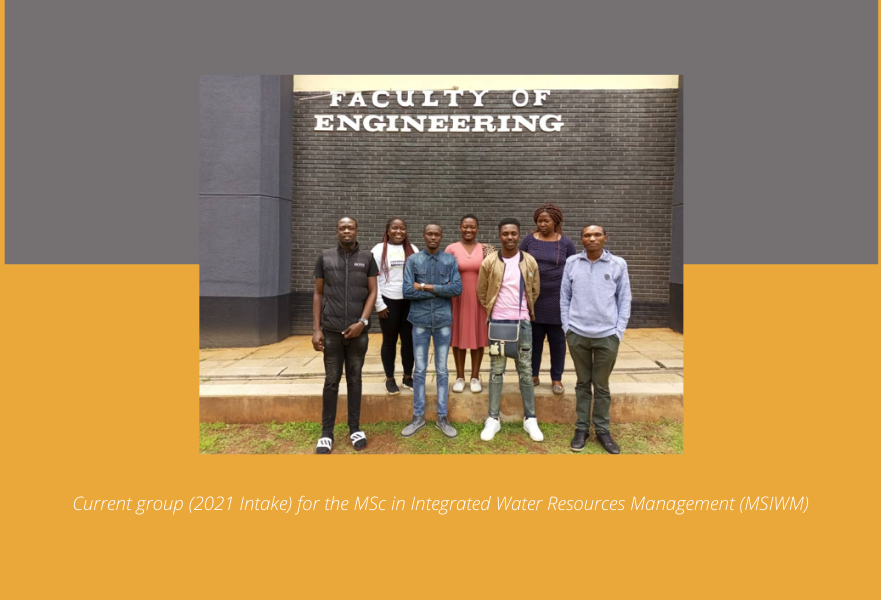
The MSc in Sanitation and Wastewater Management.
The University of Zimbabwe in 2021 joined the Global Sanitation Graduate School (GSGS), which is a platform to facilitate the development and empower the dissemination of knowledge on sanitation through postgraduate (MSc) programs, online (self-study and instructor-led) courses, face-to-face (on-campus) courses and tailor-made training so that the sanitation challenges can be embraced with deeper insight, advanced knowledge, and greater confidence.
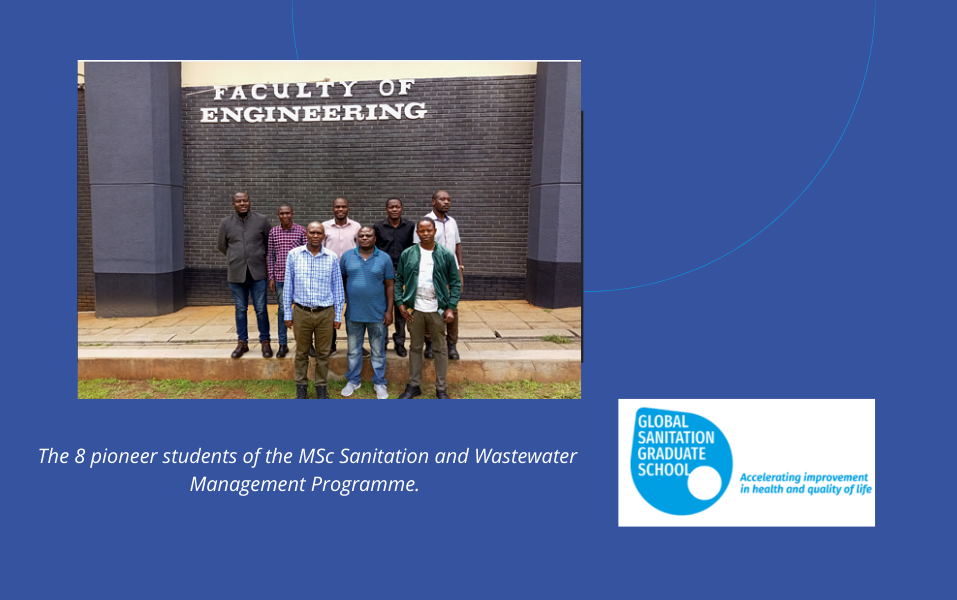
This has resulted in the university through its capable Construction and Civil Engineering Department launching the MSc Programmes in Sanitation and Wastewater Management. The first enrolment was in October 2021 with 12 candidates. The Bill & Melinda Gates Foundation, IHE Delft and their partners funds the MSc Programme. Diploma and Certificate will be launched later in the year. For more see: https://sanitationeducation.org/
REGULATIONS FOR THE MASTER OF SCIENCE DEGREE IN SANITATION AND WASTEWATER MANAGEMENT (MSWM)
1. INTRODUCTION
These regulations should be read in conjunction with the General Regulations for the Master’s Degree by Coursework, hereinafter referred to as the General Regulations.
2. ENTRY REQUIREMENTS
- To be admitted into the Programme, candidates must have normally obtained an acceptable first degree in an appropriate field with a classification of Upper Second Class or better. The appropriate fields are Civil Engineering, Chemical Engineering, Environmental Engineering, or equivalent.
- All candidates should have a minimum of proven two (2) years relevant and proven experience.
- The Programme will be conducted in English and any candidate with qualifications from a non-English speaking country will be required to prove proficiency in English by providing a Test of English as a Foreign Language (TOEFL) or International English Language Testing System (IELTS) certificate or equivalent. If necessary, the University may conduct internal proficiency in English tests, and candidates invited to such tests must meet their own travel and living expenses during the duration of the tests.
3. REGISTRATION
Application for admission with the necessary supporting documents must be made to the Deputy Registrar (Academic) on the appropriate Form according to General Academic Regulations.
4. DURATION OF THE PROGRAMME
The Programme duration is normally 18 months for full-time students and 36 months for part-time students. The minimum duration to complete the Programme for Part-time students shall be 24 months.
5. STRUCTURE OF THE PROGRAMME
The programme comprises a taught part followed by a Dissertation
The taught part shall comprise 8 modules
- Of the eight taught modules, seven shall be compulsory. The Dissertation, which shall be done through research, shall be a compulsory module. Table L1 lists compulsory modules while Table L2 lists options.
Table L1 Compulsory Modules
| Module Code | Module Title | Credits |
| SWM501 | Sewerage and Sanitation Technology and Systems | 30 |
| Unit 1: Introduction to Sewerage and Sanitation Systems & Services | 15 | |
| Unit 2: Sewage and Sanitation Technologies and Systems | 15 | |
| SWM502 | Environmental Chemistry & Microbiology, Epidemiology and Public Health | 36 |
| Unit 1: Environmental Chemistry & Microbiology | 20 | |
| Unit 2: Epidemiology and Public Health | 16 | |
| SWM503 | Wastewater Treatment | 38 |
| Unit 1: Wastewater Treatment I | 20 | |
| Unit 2: Advanced Wastewater Treatment and Reuse | 18 | |
| SWM504 | Environmental Impact Assessment, Policies, Laws, Social and Behaviour Change | 36 |
| Unit 1: Environmental & Social Impact Assessment and Management | 14 | |
| Unit 2: Sanitation policies, laws, institutions | 12 | |
| Unit 3: Behaviour change, advocacy and leadership | 10 | |
| SWM505 | GIS, Database Systems & Remote Sensing for Wastewater and Sanitation infrastructure | 30 |
| Unit 1: Geographical Information Systems | 8 | |
| Unit 2: Database Management Systems and Spatial Programming | 8 | |
| Unit 3: Remote Sensing Applications | 14 | |
| SWM506 | Research Methods, Technical Writing and Design Project1 | 40 |
| Unit 1: Research Methods | 20 | |
| Unit 2: Technical Writing | 12 | |
| Unit 3: Design Project | 8 | |
| IWM507 | Finance and Administration, Project Planning and Management | 30 |
| Unit 1: Finance and Administration for Sanitation and Wastewater Managers | 15 | |
| Unit 2: Project Planning and Management | 15 | |
| SWM570 | Dissertation | 90 |
*1 Research Methods, Technical Writing and Design Project Module is a pre-requisite to the Dissertation Module
Table L2 Optional Modules
| Module Code | Module Title | Credits |
| SWM507 | Sustainable Sanitation and Community Management | 30 |
| Unit 1: Community based management of sanitation and hygiene systems | 15 | |
| Unit 2: Water, Sanitation and Hygiene in emergencies and disasters | 15 | |
| SWM508 | Solid Waste, Sewage, Wastewater and Sanitation Systems and Services Management3 | 30 |
| Unit 1: Solid waste management | ||
| Unit 2: Decentralized sewerage and wastewater treatment systems | 15 | |
| Unit 3: Sewerage and Sanitation Infrastructure and Services Management | 15 | |
| IWM506 | Surface & Groundwater Modelling and Management | 30 |
| Unit 1: Groundwater Development and Management | 12 | |
| Unit 2: Water Resources Modelling | 10 | |
| Unit 3: Catchment Management | 8 |
Total Credits for the Programme 360
- Environmental Impact Assessment, Policies, Laws, Social and Behaviour Change Module is prerequisite to the Sustainable Sanitation and Community Management Module
- Sewerage and Sanitation Technology and Systems Module is prerequisite to the Sewage, wastewater and sanitation systems and services management Module
- Of the eight taught modules, one module shall be an option.
- A student shall not be allowed to follow a module Option without the pre-requisite module for that particular Option.
- The Options and the pre-requisite modules shall be as in Table L2:
The Programme shall be structured as follows:
- Seven compulsory taught modules shall be offered in the first ten months of the Programme.
- At least one optional module shall be offered at the end of the compulsory modules.
- The Dissertation begins as soon after the Research Methods is offered, but should end within the 18 months duration of the Programme.
- A student who fails more than one compulsory module may not be allowed to take optional modules.
- The taught component of the Programme shall be spread over 12 months. During that time, the full-time students must take eight modules. The part-time students may complete the taught component of the Programme in 24 months and may have up to 12 months for the Dissertation. Thus, part-time students may complete the Programme in 36 months.
- A standard module shall generally consist of 80 contact hours of which a minimum of 60% may be formal lectures and the remainder may comprise of exercises, tutorials, workshops, groupwork discussions, self-study, and/or laboratory work.
- The ‘Design Project’ Module Unit may include field data collection, field assessment, design development of a pilot or prototype. The scope of the design project will be outlined at the discretion of the department but generally covering the above aspects. The project may be executed as individual task or group as determined by the department. Assessment will be by written group reports and/or individual reports and oral presentation and continuous assessment.
- The Dissertation shall be conducted in accordance with guidance set by the Department of Civil Engineering and the assessment shall normally comprise of continuous assessment 40% and a thesis report and an oral defense examination contributing the remaining 60% of which the report will account for 65-75 % of this and the remainder oral defense.
Generally students will have two to three supervisors depending on the complexity and scope of the thesis study. At least one of the supervisors of the student shall normally be an academic member of staff in the Department of Civil Engineering.
If a student passes the oral examination part but fails the thesis report marking, the student shall be deemed to have failed the Dissertation and the maximum aggregate mark awarded shall be the lesser of the raw mark and 48 %.
If a student passes the thesis report examination but fails the oral defense, the student shall be deemed to have failed the Dissertation and the maximum aggregate mark awarded shall be the lesser of the raw mark and 48 %.
The Departmental Board may review and fix the final submission dates for the Dissertation as appropriate and communicate to the students accordingly.
A student who fails the Dissertation by a mark of at least 40 % may be allowed to resubmit on such conditions and within such a period as may be specified by Senate. If the Dissertation is still unsatisfactory after resubmission, then the student may apply to repeat the Dissertation on a new topic.
A student who fails the Dissertation by less than 40 % may be allowed to apply to repeat the Dissertation on a new topic.
Within two weeks after the oral examination, a student whose Dissertation has satisfied the examiners as appropriate, is required to submit five bound copies and a soft copy of the Dissertation after incorporating any comments from the examiners along with all relevant meta data collected as may be stipulated by the department. The student shall also submit an Extended Abstract of the Dissertation whose length will be determined by the Departmental Board. Only after this, shall a student be considered to have completed the Dissertation part and his or her marks be presented to the Departmental Examinations Board. Failure to submit a corrected Dissertation to the satisfaction of the Departmental Examinations Board by the set deadline will result in failure of the Dissertation of which the mark assigned will be 48% unless an official extension is granted through the Deputy Registrar’s Office.
SCHEME OF EXAMINATIONS
- Students are required to pass all compulsory modules and one optional module. Modules may not necessarily carry the same weighting and are assessed on the basis of an examination and continuous assessment. Students must satisfy the examiners in both the examination and the continuous assessment of each module.
- The final mark of a taught module shall normally comprise of a continuous assessment mark and an examination mark.
- The continuous assessment mark of a taught module shall normally contribute upto 50 % of the final mark.
- The continuous assessment mark for the ‘Design Project, Research Methods and Technical Writing’ and ‘GIS, Remote Sensing & Database Systems for wastewater and sanitation infrastructure’ Module shall contribute 50 % of the final mark.
- In line with the Faculty Regulations, a student who fails to attain a minimum of 40 % of continuous assessment shall fail the module and the maximum mark awarded to the module shall be 48 %.
- The Departmental Board may decide which modules are offered in a particular academic year.
- The pass mark of 50 % as prescribed in the General Academic Regulations is the minimal acceptable mark in all modules of the Programme.
- A student who obtains a pass mark in all eight modules of the Programme, and accumulates 270 credits, shall be deemed to have satisfied the examiners in the taught part of the Programme and will be allowed to proceed to Dissertation.
- A student should have attempted all taught modules in order to proceed to Dissertation
- A student who fails one or more modules may apply to repeat failed modules.
- A student who fails one module other than the ‘Research Methods, Technical Writing and Design Project’ Module may be allowed to proceed to Dissertation.
- A student must pass eight taught modules and the Dissertation to qualify for the award of the Master of Science degree in Sanitation and Wastewater Management.
- The aggregate mark for the award and classification of the Master of Science degree in Sanitation and Wastewater Management shall be calculated on the following basis:
Taught component 65 %
Dissertation 35 %
- The aggregate mark of the taught part is the weighted average of the eight modules.
- The award of Master of Science degree in Sanitation and Wastewater Management aligned with the General Academic Regulations as follows: Pass, a pass with Credit, a pass with Merit, or a pass with Distinction in accordance with the General Academic Regulations.
Distinction 80%+
Merit 70% - 79%
Credit 60% - 69%
Pass 50%- 59%
Fail Below 50%
SYLLABUS
In accordance with the provisions of the General Academic Regulations, detailed syllabi for modules do not form part of these regulations. Copies of the approved syllabi shall be maintained in the Department of Civil Engineering and Faculty of Engineering Offices for assistance.
NOTIFICATION OF RESULTS AND AWARD OF DEGREE
Results shall be published and degrees awarded in accordance with the provisions of the General Academic Regulations.
